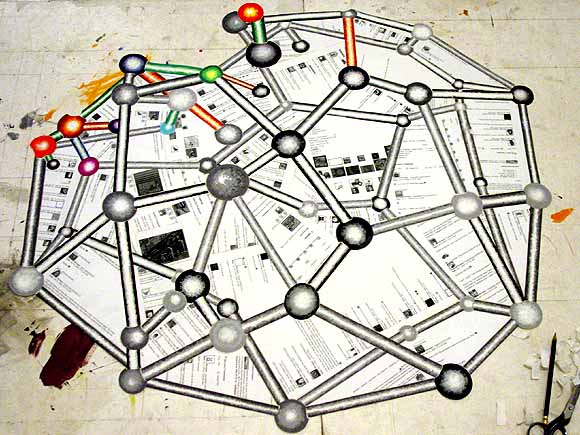



When it comes to questions concerning art and blogs, one has to resolve the distinction between blogs dealing with art and blogs being the art. When the editors of Artkrush #57 enlisted Tom Moody’s weblog in their art blog selection, it was included in the former category. But is the latter forbidden for a blog like Moody’s, which, besides containing political thoughts and remarks of other artist’s work, contains entries of the author’s work?
Tom Moody is an American artist who started as a painter and later adopted lo-fi techniques of computer aesthetics that deal with the ubiquitous Internet commercialism and ever-present kitsch of web culture. A focal point of his work is painting molecules. It’s plain enough that every pure notion of objects and their relations (such as the depiction of molecules) invites an immense plethora of interpretations, possibly drawing on sarcastic commentary like “nothing is said when everything is said”. But the structure also implies an important point of absence of contingency, “intension abstracted from extension,” an underlying structure present in every phenomenon of human acts of objectification. The recurrence of molecules in Moody’s work yields “as a matter of essence and an essence of matter”, a crossing point of latent inner structures and omnipresent superficiality.

In his recent work called BLOG, Moody puts his web blog in a white box gallery space. Viewers could approach a simple installation of a computer monitor, keyboard and mouse to browse an artist’s blog in artMovingProjects Gallery in New York. The month-long exhibition, from May 19 to June 24, didn’t change Moody’s blogging routine, though perhaps besides having an awareness of the gallery audience. He considers this the second generation of “net art”.
“I’m going to be performing with changing content, graphics, etc. Not really any different from what I normally do, but with an awareness of a specific, meat space audience, what will work on the gallery’s screen, how to explain to a reader not physically in the gallery what I’m doing and why,” writes Moody on his blog. He reflects on the exhibition occasionally, but most entries are written in a standard manner, following the purpose and tone of Moody’s writing before the exhibition.
“The weblog is a combination of things: it’s a studio diary; it’s an ongoing documentation of past work; and it’s a place for work-in-process, as well as collaborations, original pieces made for the web, and mini-curated exhibitions of things I like (of both an art and a web-oddity nature),” Moody explains in an interview for NY Arts.
What is most interesting about BLOG is Moody’s reflection of the performance, as in what escalates the recursive nature of the concept additionally illustrated by the author himself: it is “BLOG on BLOG during BLOG.”
An artist’s ego has always played an important role in the art world, but within social media culture, one doesn’t have clarity of an artist’s front and back stage. It is supposed to be considered art if it is put it in an art context, like a gallery, but does that mean that everything else isn’t art? Weblogs, and the web in general, have proved to be successful outlets for art. The gallery context is no longer the only legitimate venue for presenting art, adding another dimension to Marcel Broodthaers’ notion of an artist being an author of definition since Duchamp’s era.
Truly, the tongue-in-cheek situation stems here from Moody’s decision to make public something that is already public in a full-fledged way. Furthermore, visitors are invited to interact through commentary on the web page in the curatorial text and Moody’s blog entries. The duality of perception brings about a duality of the audience. Blog art can easily blur the line between artistic content and curatorial mission. However, Tom Moody isn’t concerned with curating immateriality. This plain overlap of understanding art as actual and virtual, institutional and lively, makes his performance an important gesture.